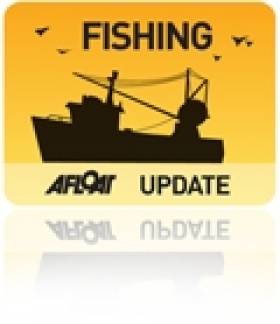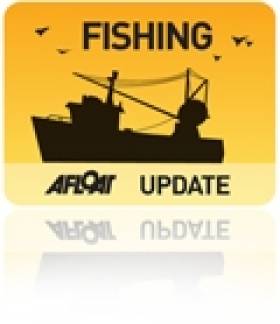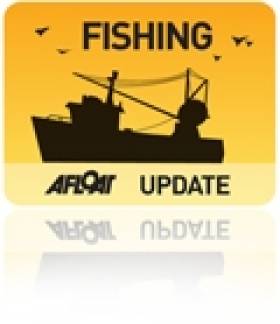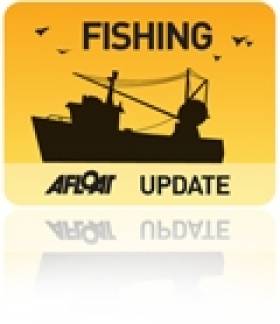Displaying items by tag: quota
The Minister for Agriculture, Food and the Marine, Simon Coveney T.D. early this morning (Wednesday) announced that he has secured 36,886 tonnes of whitefish quotas for Irish fishermen at today’s EU Fisheries negotiations. This is a 10% increase on last year.
The deal was agreed at 1.30am after 2 days of intensive negotiations.
The whitefish quotas agreed amounted to a value of €131m, an increase of €10m on the 2015 figure.
For the third consecutive year, the values of whitefish and prawn quotas available in 2016 show an increase. The overall 8% increase in quota for prawns, one of Ireland’s most valuable fisheries, includes a quota uplift to support the introduction of the discards ban.
Minister Coveney said, “We are currently rolling out the most radical reform ever agreed under the Common Fisheries Policy. The phasing out of discards is a challenging policy for the fishing community to implement and is being supported by the introduction of quota uplift for fisheries affected. A discards ban will apply to prawn, whiting, haddock and hake fisheries in 2016. Fishermen are being given additional quota to cover the increased landings with an 18% overall increase for these stocks with an additional value of €9m, if more selective fishing methods are used to avoid juvenile catches.”
Minister Coveney added, “The new CFP also introduces a policy that sets quotas at the highest level possible while ensuring the sustainability of the stock (Maximum Sustainable Yield or MSY). This will result in increased quotas and stability for the fishing sector in the coming years.”
In some cases, moving towards MSY will result in short term reductions in quota as we rebuild stocks and we can see that reflected in the 4% reduction in cod in the Celtic Sea and a 13% reduction in the haddock stock in the Celtic Sea. However, the benefits of the policy are visible in the Celtic Sea where we now have an increase of 26% in the whiting stock which is now being managed at MSY levels.
The quotas secured at Council are important for ports around the coast;
- The prawn fishery is Ireland’s most important whitefish fishery and was facing a 10% cut going into Council. The final quota outcome is an 8% increase, an additional €4.8m in value terms over last year for the prawn fleet.
- North West – Greencastle and Killybegs; whitefish quotas have increased by 20% with notable increases in megrim ( 26%), monkfish (20%), north west haddock (42%) and rockhall haddock (25%).
- South and West – Ros a Mhil, Dingle, Castletownbere, Union Hall and Dunmore East; total whitefish quotas have increased by 7%. Notable increases are whiting (26%), Megrim (5%), and Hake (21%).
- The Irish Sea haddock quota is increased by (40%) which is important for the ports of Clogherhead, Howth and Kilmore Quay.
- Other notable increases are the 48% increase in the large horse mackerel quota for the pelagic fleet in the north and west coast and the 3% increase in the albacore tuna for the south west tuna fleet.
In relation to herring off the West and North West coast, further scientific advice is being sought with a view to establishing a small commercial fishery later in the year.
Finally, the Council agreed to strengthened conservation measures for the endangered sea bass stock, including the introduction of a catch and release recreational angling fishery for the first half of 2016, with a one fish bag limit for the second half of the year. This is important for the bass angling tourism business.
Concluding, Minister Coveney said, “Overall, this is a very positive and balanced package for our fishing sector. I am confident this deal for 2016 will support further growth in the seafood sector while underpinning the long term sustainability of fish stocks.”
The Minister for Agriculture, Food and the Marine, Simon Coveney TD, today expressed concern at proposals for some of Ireland’s key fisheries quotas, ahead of annual EU Fisheries negotiations in Brussels next week. The Minister said that the rolling out of the new discards ban for a number of Irish stocks added to the complexities of this year’s negotiations.
Minister Coveney said today that “Some of the proposals for stocks of great importance to Irish fleets are unnecessarily restrictive in my view and do not reflect scientific advice. We must set quotas that support sustainable fish stocks and I will support cuts where the scientific advice is clear that that is the right thing to do. The Commission is proposing a 43% and 27% cut to our cod and haddock quotas in the Celtic Sea, these stocks are stable and cuts of this magnitude are not justified. Other serious cuts are proposed for our very valuable prawn quota which is not supported by the scientific advice and for whitefish quotas in the Irish Sea. We must set quotas that support sustainable fish stocks and I will support cuts where the scientific advice is clear that that is the right thing to do. I will be making a strong case next week to Commissioner Vella to make significant changes to these quota proposals. ”.
The Minister added that “There is an added complexity to this year’s negotiations as the new landing obligation for certain stocks will apply from the 1st of January 2016. During the reform of the Common Fisheries Policy, brokered by Ireland, I was a strong advocate of a phased introduction of discards ban to end the wasteful practice of discarding high volumes of fish at sea. As part of that Reform, it was also agreed that quotas would be adjusted upwards for stocks covered by discards ban to take account of the new situation that all catches must now be landed. It is vital that this ‘uplift’ in quotas is fully applied to the stocks that come under the discards ban in 2016, to support its practical implementation.”
In 2016 Irish fisheries covered by discards ban include prawns, whiting in the Celtic Sea and Haddock in the Irish Sea and the area west of Scotland.
Minister Coveney concluded by saying that “I am meeting our industry representatives this evening in advance of Council and I also intend to meet other stakeholders on margin of the Council to get a full understanding of priorities. During the Council I will keep the industry representatives and other stakeholders fully up to date on progress and developing issues.”
The Annual Fisheries negotiations to decide on quotas for 2016 takes place on the 14th and 15th of December in Brussels.
Tense Whitefish Quota Negotiations Continue
#whitefish – The Minister for the Marine, Simon Coveney TD, took part in 'very difficult' fishing meetings yesterday on the deep cuts to white fish quotas proposed by the Commission which continued late last night.
Early morning meetings continue on difficult negotiations on quota allocations.
The Minister is insisting on a fair deal for Irish fishermen and a responsible science based deal for fish stocks.
The Minister stated that he is refusing to compromise on protecting the livelihoods of fishermen, when there is strong science to back up the Irish position.
There may be agreement late this afternoon / early evening but it is too early to accurately predict according to the Minister.
Quota Cuts of Up to Minus 64% Proposed for Key Whitefish Stocks
#whitefish – Minister for the Marine Simon Coveney TD., has expressed his serious concern at the major threat to Irelands' whitefish fleet, ahead of the upcoming EU Fisheries negotiations in Brussels. The Minister said that the Commission had produced a devastating and unnecessary set of the most severe whitefish quota cuts.
Minister Coveney said today that "If the Commission's quota proposals remain unchanged, we are facing an overall 20% cut to our whitefish and prawn quotas for 2015. In the Celtic Sea, the Commission wants to dramatically cut the key whitefish stocks on which our fleet are dependant".
The Commission's proposal is to cut Cod by -64%, Haddock by -41%, Pollack by -20%, Skates & Rays by -20%, Whiting by -14%, Monkfish by -12% and Hake by -4%. Minister Coveney said "There are also a number of other stocks where cuts of up to 20% are proposed without an acceptable justification. These levels of cuts are not justified and are not acceptable".
The Minister added that "I presented the scale and implications of these cuts to the joint Oireachtas Committee last week. (The Whitefish Fleet is facing a loss of 5,500 tonnes of whitefish quotas if the Commission's proposals are not modified at Council). The level of cuts proposed for the whitefish fisheries are extremely worrying. What is really unacceptable to me is the fact that many of these cuts are based on a very narrow interpretation of the available scientific advice and are, in my view, completely unjustified. I can accept reductions to quotas to protect the long term sustainability of our stocks but I will not accept scientifically unnecessary cuts that would undermine the sustainability of our fishing communities."
The Minister went on to say "I am frustrated with the Commission's whitefish quota proposals and I will, with the support of our industry representatives, other stakeholders and our scientists be arguing forcefully throughout the Council for a rational application of the scientific advice."
The Minister added that "I find it especially unacceptable that, in the context of the new Common Fisheries Policy and in particular the impending ban on discards, the Commission are taking such a rigid approach to the setting of quotas for 2015."
The Minister explained that " I am committed to setting quotas in accordance with Maximum Sustainable Yield (fMSY) but, in line with the agreement I brokered on the new Common Fisheries Policy, we must phase it in where it's immediate application would seriously jeopardize the social and economic fabric of the fishing fleets impacted. The Commission proposals assume its immediate application irrespective of the socio economic implications. This is not acceptable"
The Minister will attend the EU Fisheries Council in Brussels from the 15th to the 16th of December, where quotas for the Irish fleet for 2015 will be determined. The proposals put forward from the Commission impact the Irish white fish sector in particular with severe cuts in many stocks of vital importance to Ireland. The Commission has proposed cuts to pelagic stocks such as herring, mackerel, horse mackerel and boarfish. The Minister, working with our industry, is willing to accept these cuts on the basis they are justified on the available scientific advice.
Concluding, Minister Coveney said "This is my fourth December Fisheries Council and each year it seems to get more difficult. This year looks like being the most difficult one yet. I am extremely worried that despite our collective efforts we will be presented with a fait accompli of the worst set of cuts to our quotas in recent years. I will work as hard as I can with industry and other stakeholders, as well as important Member States such as France, the UK and Spain, to try and avoid that outcome. I am however very concerned that this will be an uphill task given the scale of the whitefish cuts being proposed."
Fisherman Defends Giveaway of Over-Quota Monkfish
#FISHING - A Wexford fisherman has defended the free giving away of monkfish to the public yesterday morning after exceeding an EU quota.
RTÉ News reports that Seamus O'Flaherty, owner of the trawler Saltees Quest, handed out the fish to hundreds of passers-by at Kilmore Quay rather than have the surplus catch thrown back into the water.
The vessel's skipper Jimmy Byrne defended the move as a protest against an EU rule that requires over-quota fish to be discarded at sea.
According to The Irish Times, officers with the Sea Fisheries Protection Authority, who observed the monkfish giveaway yesterday, have prepared a file for submission to the Director of Public Prosecution.
The authority said it found a large quantity of monkfish retained on the vessel which had been logged as having been discarded - and emphasised that catches landed that are not declared as discards are still counted against the national quota.
Byrne, meanwhile, described the practice of discards of dead fish as "crazy" especially when many people in Ireland are "going hungry".
He commented: “I have a certain quota of fish to catch and the monkfish end up getting caught. There’s more monkfish in Ireland than ever before. I can’t tell the monkfish not to go into the net."
The Irish Times has more on the story HERE.
Fishing Industry Welcomes Selective Nets, Grant Aid at Irish Skipper Expo
#FISHING - Minister for the Marine Simon Coveney briefed the Irish Skipper Expo in Galway last weekend on a new initiative promoting the use of selective conservation fishing nets, which allow young fish to escape.
Under the initiative in the Celtic Sea, additional quotas of up to 25% will be made available by the minister to skippers of Irish fishing boats which use an escape panel in their nets, allowing young whiting and haddock to escape.
The escape panel, developed by the Irish industry, has been endorsed at EU level and is expected to be a mandatory requirement later in the year.
Minister Coveney said on Saturday: “The use of this panel will significantly reduce discards of juvenile whiting and haddock in the Celtic Sea, allowing juvenile fish to grow and mature and contribute to increased stock size and returns for fishermen in future years.
"I believe that this offers an example of a practical approach to dealing effectively with the discards problem and retention of a flexible quota allocation system that we should take forward in the context of the Common Fisheries Policy Review."
In other news, Bord Iascaigh Mhara (BIM) announced €1.5 million in grant aid for the Irish fishing industry at the expo.
A spokesperson for BIM confirmed to the Galway Independent that the funding will be available to industry through a variety of schemes including fleet safety, seafood environmental management, lobster V-notching and coastal action groups.
Over 100 companies displayed their products and services to fishermen at the Irish Skipper Expo International 2012, held at the Galway Bay Hotel on 24-25 February.
- Fishing
- commercial fishing
- Minister for the Marine
- Simon Coveney
- Irish Skipper Expo
- Skipper Expo International
- 2012
- Galway Bay Hotel
- Galway
- conservation
- selective
- quota
- Celtic sea
- initiative
- discards
- grant aid
- Bord Iascaigh Mhara
- BIM
- Funding
- Coastal
- Seafood
- whiting
- haddock
- juvenile fish
- Common Fisheries Policy



























































